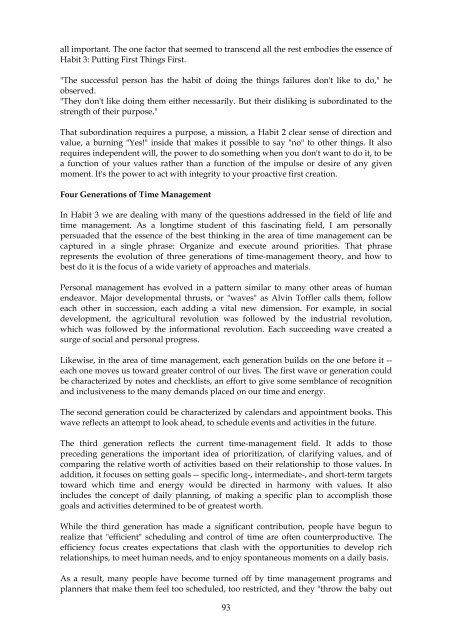Covey - The 7 habits of highly effective people
You also want an ePaper? Increase the reach of your titles
YUMPU automatically turns print PDFs into web optimized ePapers that Google loves.
all important. <strong>The</strong> one factor that seemed to transcend all the rest embodies the essence <strong>of</strong><br />
Habit 3: Putting First Things First.<br />
"<strong>The</strong> successful person has the habit <strong>of</strong> doing the things failures don't like to do," he<br />
observed.<br />
"<strong>The</strong>y don't like doing them either necessarily. But their disliking is subordinated to the<br />
strength <strong>of</strong> their purpose."<br />
That subordination requires a purpose, a mission, a Habit 2 clear sense <strong>of</strong> direction and<br />
value, a burning "Yes!" inside that makes it possible to say "no" to other things. It also<br />
requires independent will, the power to do something when you don't want to do it, to be<br />
a function <strong>of</strong> your values rather than a function <strong>of</strong> the impulse or desire <strong>of</strong> any given<br />
moment. It's the power to act with integrity to your proactive first creation.<br />
Four Generations <strong>of</strong> Time Management<br />
In Habit 3 we are dealing with many <strong>of</strong> the questions addressed in the field <strong>of</strong> life and<br />
time management. As a longtime student <strong>of</strong> this fascinating field, I am personally<br />
persuaded that the essence <strong>of</strong> the best thinking in the area <strong>of</strong> time management can be<br />
captured in a single phrase: Organize and execute around priorities. That phrase<br />
represents the evolution <strong>of</strong> three generations <strong>of</strong> time-management theory, and how to<br />
best do it is the focus <strong>of</strong> a wide variety <strong>of</strong> approaches and materials.<br />
Personal management has evolved in a pattern similar to many other areas <strong>of</strong> human<br />
endeavor. Major developmental thrusts, or "waves" as Alvin T<strong>of</strong>fler calls them, follow<br />
each other in succession, each adding a vital new dimension. For example, in social<br />
development, the agricultural revolution was followed by the industrial revolution,<br />
which was followed by the informational revolution. Each succeeding wave created a<br />
surge <strong>of</strong> social and personal progress.<br />
Likewise, in the area <strong>of</strong> time management, each generation builds on the one before it --<br />
each one moves us toward greater control <strong>of</strong> our lives. <strong>The</strong> first wave or generation could<br />
be characterized by notes and checklists, an effort to give some semblance <strong>of</strong> recognition<br />
and inclusiveness to the many demands placed on our time and energy.<br />
<strong>The</strong> second generation could be characterized by calendars and appointment books. This<br />
wave reflects an attempt to look ahead, to schedule events and activities in the future.<br />
<strong>The</strong> third generation reflects the current time-management field. It adds to those<br />
preceding generations the important idea <strong>of</strong> prioritization, <strong>of</strong> clarifying values, and <strong>of</strong><br />
comparing the relative worth <strong>of</strong> activities based on their relationship to those values. In<br />
addition, it focuses on setting goals -- specific long-, intermediate-, and short-term targets<br />
toward which time and energy would be directed in harmony with values. It also<br />
includes the concept <strong>of</strong> daily planning, <strong>of</strong> making a specific plan to accomplish those<br />
goals and activities determined to be <strong>of</strong> greatest worth.<br />
While the third generation has made a significant contribution, <strong>people</strong> have begun to<br />
realize that "efficient" scheduling and control <strong>of</strong> time are <strong>of</strong>ten counterproductive. <strong>The</strong><br />
efficiency focus creates expectations that clash with the opportunities to develop rich<br />
relationships, to meet human needs, and to enjoy spontaneous moments on a daily basis.<br />
As a result, many <strong>people</strong> have become turned <strong>of</strong>f by time management programs and<br />
planners that make them feel too scheduled, too restricted, and they "throw the baby out<br />
93


